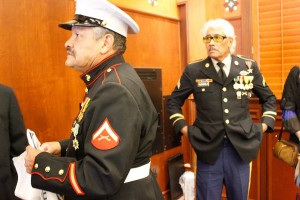Vietnam veterans fight a new war against deportation from the country they served
|
EL PASO — Manuel and Valente Valenzuela have been fighting a war all their lives. The U.S. military veterans fought for America in heavy rain under enemy fire in the Vietnam War but now the country they fought for wants to kick them out. They wore the Army and Marine uniforms, laced-up their boots, loaded their weapons, and protected the soil they stand on today. Now they are engaged in a different kind of war, defending themselves against their own government in a protracted fight for citizenship and the right to remain in the U.S.
On November 2008, Manuel Valenzuela, an Army veteran, received a removal notice from Homeland Security stating that he was being deported from this country. A few months later in January 2009 his brother Valente, a Marine veteran, received the same notice.
